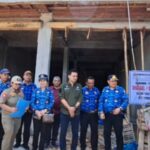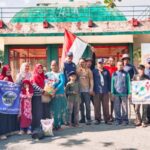Victims of the fire that destroyed dozens of houses on Putri Hijau Street, Kesawan Village, West Medan District, have now taken refuge in 3 different locations. They are staying at the Istiqomah Mosque, the Kesawan Office, and nearby residents’ homes.
The fire in Gudpalrah Alley, Putri Hijau Street, Kesawan Village, West Medan District, burned down 37 houses, mostly rental properties, in the early hours of Sunday (20/7/2025).
Residents reported receiving food assistance from Putri Hijau Hospital and the Medan City Disaster Management Agency (BPBD).
ALSO READ:
As of now, the Medan BPBD team is still conducting detailed data collection regarding the number of houses burned in the area.
“We are still compiling data, and the number of affected individuals will be announced later,” said a BPBD officer involved in the data collection.
The cause of the fire remains unknown at this time. Police have launched an investigation to determine the origin of the fire.
Putri Hijau Street
Putri Hijau Street, located in Medan, Indonesia, is named after the legendary Malay princess Putri Hijau (“Green Princess”), who is central to local folklore. The area reflects Medan’s rich cultural heritage, blending Malay, Dutch colonial, and Indonesian influences. Today, it is a bustling street known for its historical significance and vibrant local life.
Kesawan Village
Kesawan Village is a historic area located in Medan, North Sumatra, Indonesia, known for its well-preserved colonial-era architecture. Established during the Dutch colonial period, it was once a bustling commercial hub with shops, offices, and cultural landmarks. Today, it reflects Medan’s multicultural heritage, blending Chinese, Malay, and European influences.
West Medan District
West Medan District is a bustling urban area in Medan, Indonesia, known for its commercial and cultural significance. Historically, it developed as part of Medan’s expansion during the Dutch colonial era, becoming a hub for trade and diverse communities, including Chinese, Malay, and Indian influences. Today, it features markets, shops, and landmarks like the historic Shri Mariamman Temple, reflecting its multicultural heritage.
Istiqomah Mosque
The Istiqomah Mosque, located in Semarang, Indonesia, is one of the largest and most prominent mosques in Central Java. Built in 1987, it features a grand architectural design with a towering minaret and a spacious prayer hall, serving as both a religious and cultural center for the local Muslim community. The mosque plays a key role in Islamic activities, education, and community events in the region.
Kesawan Office
The **Kesawan Office** is a historic building located in Medan, Indonesia, originally constructed in the early 20th century during Dutch colonial rule. It served as a commercial and administrative hub, reflecting Medan’s growth as a major trading center in Sumatra. Today, it stands as a heritage site, showcasing colonial-era architecture and the city’s economic history.
Gudpalrah Alley
Gudpalrah Alley is a historic and culturally significant passage located in an ancient part of a city, known for its traditional architecture and vibrant local life. While specific historical details about Gudpalrah Alley may be limited, such alleys often serve as remnants of old urban planning, reflecting the heritage and daily customs of past communities. Today, it may be a popular spot for visitors seeking an authentic glimpse into the area’s history and culture.
*(Note: If “Gudpalrah Alley” refers to a specific location with documented history, please provide additional details for a more accurate summary.)*
Putri Hijau Hospital
Putri Hijau Hospital, located in Medan, North Sumatra, Indonesia, is a well-known healthcare facility with historical significance tied to the local Malay community. The hospital’s name, which means “Green Princess,” is inspired by a famous local legend about a mythical princess. Established during the Dutch colonial era, it has since evolved into a modern hospital serving the region.
Medan City Disaster Management Agency (BPBD)
The Medan City Disaster Management Agency (BPBD) is a local government body in Medan, Indonesia, responsible for disaster prevention, mitigation, response, and recovery. Established to address natural and man-made disasters, it plays a key role in coordinating emergency efforts and community preparedness. Its formation aligns with Indonesia’s national disaster management framework, reflecting Medan’s vulnerability to floods, fires, and other regional hazards.






